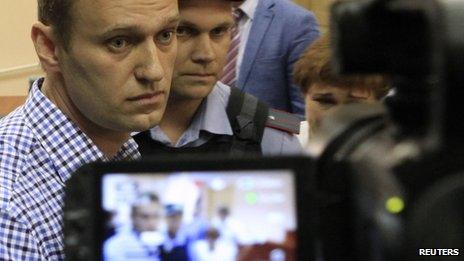Navalny trial: How Russian media told it
- Published

The prison sentence had been expected but there was still shock in the courtroom
Coverage of the trial of opposition leader Alexei Navalny - sentenced to five years in prison for embezzlement - has exhibited some of the best and worst aspects of the Russian media.
On the one hand, the Russian judiciary embraced transparency, allowing live online video relays from the courtroom, where participants and observers of the trial were allowed to freely tweet their comments and impressions.
Shortly after the verdict and before he was taken into custody, Mr Navalny himself tweeted: "Fine. Don't miss me too much, you guys. Most importantly, don't sit around doing nothing. The toad won't get off the oil pipe by itself." The "toad" was what he called President Vladimir Putin's government in a post on his LiveJournal blog.
That post was retweeted more than 5,000 times in three hours.
This openness in the coverage of the trial is in keeping with a ruling by the Russian Supreme Court in December 2012, which basically said that journalists should have unrestricted access to court proceedings unless there is very good reason to decide otherwise.
It is also part of a broader policy of open government that the Russian authorities have been pursuing over the past few years.
Among other things, this has facilitated Mr Navalny's ability to expose corruption and malpractice in the awarding of government contracts.
Crime news?
Alongside that transparency, though, the big state-controlled TV stations - still the main source of news for the overwhelming majority of Russians - have been covering the Navalny case in a highly selective and one-sided fashion.
According to data from the media monitoring service Medialogiya, the programme on terrestrial TV that has devoted the most coverage to Mr Navalny since the trial began is a crime news programme on NTV, a channel owned by the state gas monopoly Gazprom. That same programme had earlier attacked the opposition in a series of special broadcasts called Anatomy of a Protest.
Nearly all the reports on that programme and on state-controlled TV's news bulletins have simply parroted the prosecution case and given virtually no air-time to the defence.
State TV has also bracketed the Navalny case with allegations of corruption at the defence ministry, which are on a far grander scale, involving hundreds of millions of dollars of public money.
News bulletins on the official channel Rossiya 1 on the morning of the verdict confined themselves to showing the judge reading out the sentence and briefly mentioning that the defence intended to appeal.
There was no suggestion that the verdict was in any way controversial, nor any mention of the negative reaction it had attracted both in Russia and worldwide.
Contrast that with social media, where tens of thousands of tweets and posts have been pouring out, most of them condemning the verdict and sympathising with Mr Navalny.
Some of the sympathy has come from surprising quarters.
Pro-Putin TV presenter Tina Kandelaki tweeted to her million-plus followers: "I have never believed in Navalny and never saw any potential in him. Now he has potential."
Mr Navalny's supporters, meanwhile, are defiant. "Navalny got five years in jail. Now nothing but a revolution will do," tweeted a member of the protest art group Voina.
BBC Monitoring, external reports and analyses news from TV, radio, web and print media around the world. For more reports from BBC Monitoring, click here. You can follow BBC Monitoring on Twitter , externaland Facebook, external.